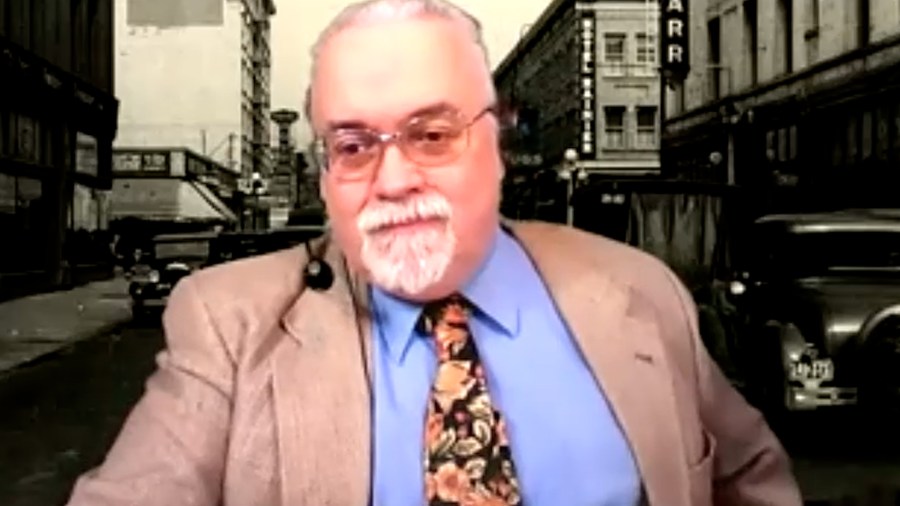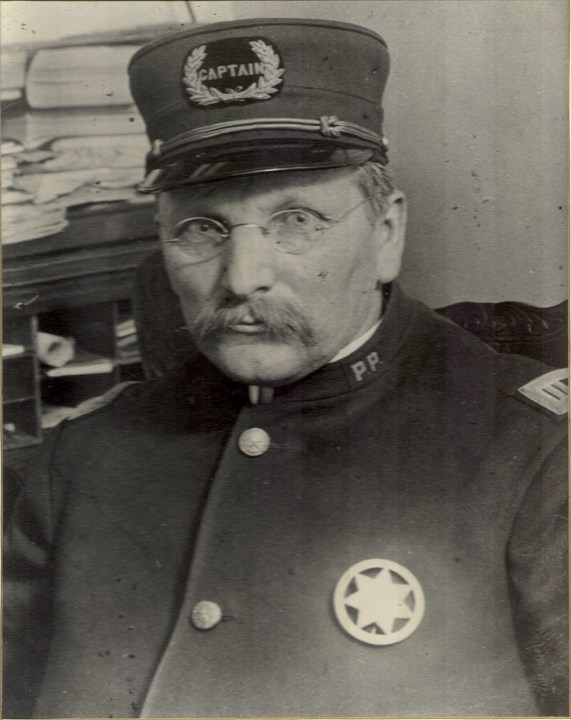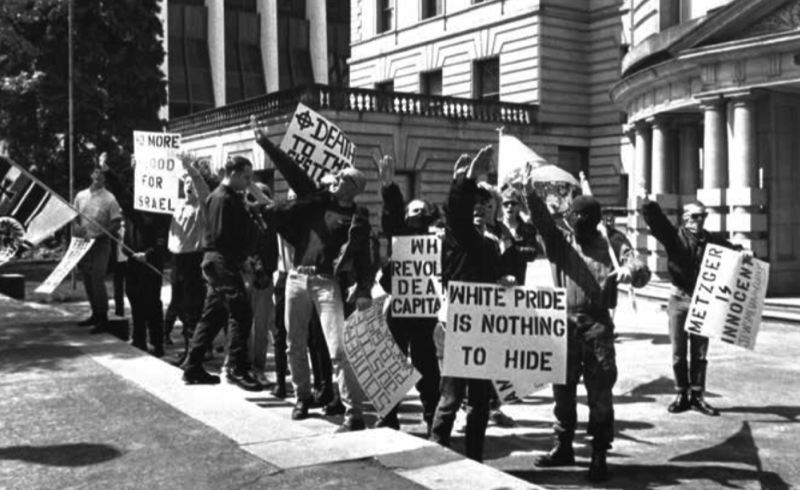PORTLAND, Ore. (KOIN) — Portland may seem like it’s facing an unprecedented era with a triple whammy of a massive public health crisis in the form of the coronavirus pandemic, unrest amid social justice demonstrations, and a rise in violent crime, all at the same time.
But for local criminal historian J.D. Chandler, it’s not an unfamiliar place for the city to find itself.
“I wouldn’t say that it’s really unprecedented. Because I think we really do have one particular period of time where it’s very similar. Things are different, obviously, but it was a hundred years ago, 1918 to 1920 with the Spanish influenza,” said Chandler, who has authored many books on Portland’s history, such as “Hidden History of Portland, Oregon,” “Murder & Mayhem in Portland, Oregon,” “Murder & Scandal in Prohibition Portland,” which he co-authored with Theresa Griffin Kennedy, and “Portland Rogues Gallery,” his most recent.

In terms of civil unrest around that period, Chandler said it was a very active time in terms of the U.S. labor movement, in particular with a group called the Industrial Workers of the World, which had a high number of members in Portland and Southwest Washington. Many lumber camps and sawmills were members of the IWW and other unions and often held strikes or demonstrations publicly at the time.
When asked whether that was a period where demonstrations became riotous, Chandler said that it’s “kind of a loaded way to ask the question,” since the term is subjective, in his view.
“‘Riot’ is used against people that you don’t like,” he said. “People who are protesting, politically, for something you believe in are not rioting. People who are protesting for something you don’t believe in are rioting. That’s the way it’s always been.”
Chandler described the IWW in his blog as a “militant, confrontational group” that would take on issues of the most oppressed workers in the country, including women, children, transient workers and the unemployed. Unlike union movements that came before it, they were inclusive across race and gender lines. They also used “militant tactics of ‘cultural resistance'” and direct action.
Chandler said the IWW was a group that the U.S. government and Portland city government labeled as violent, radical and needing to be destroyed. Aggressive union-busting tactics were used against the organization by government entities, Chandler said.
“The IWW offices were destroyed, IWW members were arrested, deported, murdered, all kinds of things happened. Framed for murder, that happened in 1913,” he said.

In 1913, then-Portland Police Chief Enoch Slover attempted to frame IWW organizer Gordon Napier for the murder of John A. Brown, Chandler’s blog stated. Slover was the ringleader of corrupt cops on the payroll of brothel owners in the city’s North End and was later fired.
The city government and its police repeatedly jailed IWW members to stop public protests during a cannery strike in the Summer of 1913, according to the Oregon Encyclopedia, which is an Oregon Historical Society project. As part of the union’s “free speech fights” it held in the region, they would call in outside reinforcements to fill the jail and overwhelm the city until authorities allowed them to speak publicly.
The federal government became alarmed by the growing unrest in Pacific Northwest lumber camps and sawmills led by the IWW, as well as the organization’s vocal opposition to World War I. In 1917, the region’s logging came under the control of the U.S. Army.
During a strike at Portland’s waterfront in 1922, members of the International Longshoremen’s Association successfully shut down the Port of Portland for a week to negotiate better employment terms, but its operations soon resumed when employers brought live-aboard strikebreakers to continue the labor. As frustration mounted among the union men, fistfights and other outbreaks of violence occurred. Employers then used this as a reason to seek a court order against union members from congregating where there “might be outbreaks of violence,” resulting in union members being arrested when picketing occurred, according to Offbeat Oregon History.
Chandler said the anti-eviction blockade and direct action that resulted in a stand-off between a local family and the city back in December 2020, known as the “Red House on Mississippi,” also parallels historic direct actions related to housing from the late 1920s and early ‘30s.
During a period of high unemployment, many citizens had their utilities, such as water and power, cut off as a result of being unable to pay their bills. People would then contact their neighborhood communist organizations for help, he said.
“When, say, you got your electricity got cut off, you would go to your local communist organization, most of the neighborhoods of Portland had a communist organization, tell them what had happened, and they would come turn your electricity or your water back on,” Chandler said. “So it was direct action, very similar to what they’re doing with evictions in North Portland. So I thought that was an interesting parallel.”
In terms of the city seeing a rise in violent crime, Chandler said there have been instances of that intermittently throughout history, particularly when a major war was coming to a close.
“We saw it 1918-1920, we saw it in 1945-1948, we saw it in 1970-75. Violent crime rose when the wars ended. We’ve got a war ending that we’ve been in for a long time and violent crime is rising.”

A rise in violent crime also surged around the time of the Civil War, in the 1860s, Chandler said.
“There was violence at that time, there were probably even shootouts. There was violence in southern Oregon around support for the Confederacy. And that lasted well into the 1870s.”
While the Trump administration saw many instances of clashes between far-right and left-wing groups cropping up each summer in Portland, similar ideological battles also occurred in the streets of the Rose City in the 1860s, Chandler said.
“Because Portland was a Union town, we supported the Union. But a lot of the rest of Oregon supported the Confederacy and wanted the United States to recognize the Confederacy and not fight.”
There was even talk briefly of the Pacific Northwest region branching off from the United States, called the Pacific Republic, but that never really got off the ground, Chandler said.
In many cities across Oregon, including Portland, skirmishes occurred when someone tried to display a Confederate flag, in all likelihood a variation of the palmetto flag of South Carolina at the time, he said.
“Displaying a Confederate flag, it was fighting words. And at least one person was killed for displaying a Confederate flag in Portland,” Chandler said.
In the 1920s, a few years after the release of the film Birth of a Nation, the KKK became a popular and powerful political party in Portland, before declining in popularity in 1925.
“In 1924, the entire Multnomah County Commission was recalled because of a corrupt deal that created the Burnside and Sellwood bridges. And all three of the people on the board were supported by the KKK,” Chandler said. “So when they were recalled for corruption, it completely destroyed the KKK’s credibility in Oregon and they declined as an organization.”
He said racist organizing continued to occur in Oregon after that, just under different entities.
In terms of the city’s history with antifascists, the umbrella term for far-left leaning militant groups that confront or resist neo-Nazis and white supremacists at demonstrations, that can be traced back to the late 1980s and early ‘90s, Chandler said.

“We did see fighting between the White Aryan Resistance and the punk rockers in Old Town in the ’90s. But what we also saw was young kids from poor neighborhoods and from outside of Portland recruited and radicalized and then brought to Portland for violent action. It led to the murder of Mulugeta Seraw,” he said. “I’m still collecting the data on it, but I’ve identified at least four murders in the Pacific Northwest that were associated with this White Aryan Resistance.”
Chandler said he thinks Portland may be on track this year to reach a high watermark of murders that hasn’t been seen in decades. The Portland Police Bureau told KOIN 6 News that the all-time record is approximately 70 murders that occurred in 1987. Five months into 2021 and already 28 homicides have occurred, according to a figure provided to KOIN 6 News by PPB, as of May 5.
Chandler, who is a military veteran and former anti-nuclear and union activist, said he’s also worried about issues relating to police power and city corruption that have historical roots in Portland.
In terms of the black bloc activists who take to the streets in Portland in direct actions, who often dress in all black and wear masks to conceal their identities, and “who are violent for no real reason,” he said such individuals began cropping up in smaller pockets as far back as the Occupy movement of the early 2010s. Although he added there was some violence occurring at protests, intermittently, back in the ‘90s in Seattle as well.
He said he found the Occupy movement generally encouraging at the time, but noticed some danger signs even back then, such as the younger generation of protesters not being interested in what the older activists have to say in terms of political organizing tactics.
“Violent protest does not work to bring about progressive change. Violent protest brings about regressive, reactionary change. And that’s been my message all along. Peaceful protest is the only protest that is going to bring about progressive change. So I’m very discouraged by the violence that we’re seeing in these protests right now,” Chandler said.
He added that he can understand the frustration people have with this country, but that the impulse toward violence is not good.
We want to hear from you. Send us your comments to isportlandover@koin.com and tune in Monday, May 17 for an hour long special at 7PM.
